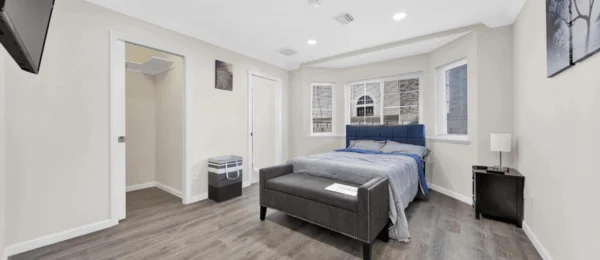
Benzodiazepine Addiction Treatment Lancaster
Welcome to Resilient Recovery, a luxury rehab in Lancaster dedicated to helping individuals overcome benzodiazepine addiction. With the growing benzo addiction epidemic sweeping across the United States, we understand the urgent need for specialized care and support.
Our team of experienced professionals is here to provide a compassionate and effective treatment approach, empowering our clients to reclaim their lives and achieve lasting recovery. Our Lancaster Rehab combines luxury amenities with evidence-based therapies, creating an environment where healing and transformation thrive.
What Are Benzodiazepines?
Benzodiazepines, commonly referred to as benzos, are a class of psychoactive drugs known for their sedative, hypnotic, anxiolytic (anti-anxiety), muscle relaxant, and anticonvulsant properties. They belong to the larger group of central nervous system (CNS) depressants and are widely prescribed for various medical conditions, including anxiety and other mental health issues.
Benzos work by enhancing the effects of gamma-aminobutyric acid (GABA), a neurotransmitter that inhibits or slows down brain activity – by increasing GABA’s inhibitory action; benzodiazepines help reduce this excessiveness and induce a calming effect on the central nervous system. This results in feelings of relaxation, sedation, and reduced anxiety.
These medications come in different forms, including tablets, capsules, oral liquids, and injectables. They are typically prescribed to manage conditions such as anxiety disorders, insomnia, seizures, muscle spasms, and alcohol withdrawal symptoms. Some commonly prescribed benzodiazepines include diazepam (Valium), alprazolam (Xanax), lorazepam (Ativan), clonazepam (Klonopin), and temazepam (Restoril), among others.
It’s important to note that Benzos are highly effective when used as prescribed and under the guidance of a healthcare professional. However, due to their calming and sedating effects, they also carry a risk of dependence, tolerance, misuse or addiction. Benzo misuse or prolonged substance use of these drugs can lead to physical and psychological dependence, making it challenging for individuals to discontinue their use without professional help.
We specialize in providing comprehensive treatment for benzodiazepine addiction, helping individuals safely detox from these substances and providing the necessary support and therapies for lasting recovery. Our dedicated team understands the complexities of drug addiction and is equipped to guide individuals through the process of healing and rebuilding their lives.

Signs And Symptoms Of Benzo Addiction
Recognizing the signs and symptoms when someone is struggling with benzodiazepine addiction is crucial in identifying a problem and seeking timely help. While individual experiences may vary, there are common indicators that can signal the presence of benzo abuse. It’s important to remember that the following signs and symptoms may manifest to different degrees in each person:
Physical Symptoms
- Drowsiness and sedation.
- Slurred speech.
- Impaired coordination and unsteady gait.
- Muscle weakness.
- Headaches or migraines.
- Blurred vision.
- Nausea or vomiting.
- Reduced appetite or weight loss.
- Tremors or shaky hands.
Behavioral and Psychological Symptoms
- Increased tolerance, requiring higher doses for the desired effects.
- Persistent desire to use benzos.
- Failed attempts to cut down or quit using benzos.
- Spending excessive time obtaining, using, or recovering from the drug.
- Neglecting personal and professional responsibilities.
- Social withdrawal or isolation.
- Engaging in risky behaviors while under the influence.
- Mood swings, irritability, or aggression.
- Memory problems or cognitive impairment.
- Anxiety or panic attacks when not using benzodiazepines.
Emotional and Mental Health Symptoms
- Heightened anxiety or restlessness.
- Feelings of depression or sadness.
- Intense cravings for benzos.
- Poor concentration or difficulty focusing.
- Insomnia or disturbed sleep patterns.
- Paranoia or hallucinations (in severe cases).
- Suicidal thoughts or behaviors (in extreme cases).
It’s important to note that individuals may not exhibit all of these signs, and some symptoms may be more pronounced than others. If you or a loved one is experiencing several of these signs and symptoms, it is crucial to seek professional help and support through a specialized treatment plan.
Our experienced team is dedicated to providing individualized treatment and evidence-based therapies to address the unique challenges of benzo addiction.
Effects Of Benzodiazepine Addiction
Benzodiazepine addiction can have profound effects on various aspects of an individual’s life, including physical health, mental well-being, relationships, and overall functioning.
Understanding the effects of benzo addiction is essential in highlighting the urgency of seeking treatment and the importance of recovery. Here are some common effects associated with benzodiazepine use.
Physical Effects
- Drowsiness and fatigue.
- Impaired motor coordination and slowed reflexes.
- Muscle weakness and tremors.
- Headaches and dizziness.
- Gastrointestinal issues, such as nausea, vomiting, and constipation.
- Respiratory depression (slowed breathing).
- Increased risk of accidents or injuries.
Mental and Emotional Effects
- Worsening anxiety or panic symptoms.
- Mood swings and irritability.
- Cognitive impairments, including memory problems and difficulty concentrating.
- Confusion and disorientation.
- Emotional numbness or detachment.
- Increased risk of developing depressive symptoms.
Social and Interpersonal Effects
- Withdrawal from social activities and isolation.
- Strained relationships with family, friends, and colleagues.
- Loss of interest in previously enjoyed hobbies and activities.
- Legal and financial problems due to substance misuse.
- Decreased work or academic performance.
- Inability to fulfil responsibilities and commitments.
Tolerance and Dependence
- As benzodiazepine use continues, tolerance may develop, requiring higher doses to achieve the desired effects.
- Dependence can occur, leading to withdrawal symptoms when attempts are made to reduce or stop using benzodiazepines.
Risk of Overdose
- Misusing benzodiazepines by taking higher doses than prescribed or combining them with other substances (e.g., alcohol) can increase the risk of overdose.
- Symptoms of an overdose may include extreme sedation, respiratory depression, confusion, and loss of consciousness, which can be life-threatening.
Long-Term Consequences
- Prolonged benzodiazepine addiction can result in severe physical and mental health complications, such as organ damage, cognitive impairment, and increased risk of developing other substance use disorders.
It’s important to remember that these effects can vary in severity and may impact individuals differently.
How Do I Know If A Loved One Is Addicted To Benzodiazepines?
Recognizing signs of benzodiazepine addiction in a loved one can be challenging, as individuals may attempt to hide their substance abuse or minimize its impact.
However, several common indicators can help you identify if someone is struggling with benzo addiction. Look for the following signs:
Changes in Behavior and Mood
- Sudden and unexplained shifts in mood, such as increased irritability, agitation, or mood swings.
- Isolation and withdrawal from social activities or previously enjoyed hobbies.
- Neglecting responsibilities, work, or school obligations.
- Engaging in secretive or suspicious behavior.

Physical and Health-related Signs
- Noticeable sedation, drowsiness, or appearing overly calm.
- Slurred speech and impaired coordination.
- Lack of focus and memory problems.
- Weight loss, changes in appetite, or gastrointestinal issues.
- Tremors, muscle weakness, or difficulty with motor skills.
Neglecting Personal Appearance and Hygiene
- Disheveled appearance, lack of grooming, or poor personal hygiene.
- Neglected or deteriorating physical health.
Increased Tolerance and Dependence
- Needing higher doses of benzodiazepines to achieve the desired effects.
- Exhibiting signs of withdrawal when attempting to reduce or stop benzodiazepine use.
Changes in Social Relationships
- Strained relationships with family members, friends, or colleagues.
- Decreased interest in maintaining social connections.
- Spending time with new social circles that may be involved in drug abuse.
Financial and Legal Issues
- Unexplained financial difficulties or frequent requests for money.
- Legal problems related to drug use or obtaining benzos illegally.
If you observe several of these signs in your loved one, it is crucial to approach the situation with compassion and concern. Open communication, expressing your observations and worries, can be the first step toward helping them seek professional assistance.
Benzodiazepine Addiction Treatment Lancaster
Benzodiazepine treatment at Resilient Recovery is designed to provide comprehensive care and support for individuals struggling with benzo dependence.
Our treatment approach combines evidence-based therapies, medical expertise, and personalized attention to address the unique needs of each client. Here are some key elements of our benzo addiction treatment.

Medical Detoxification
The treatment program often begins with a medically supervised detox phase. Our experienced medical team closely monitors clients to ensure their safety and comfort as they withdraw from benzodiazepines.
Medications may be administered to manage withdrawal symptoms and minimize the discomfort of the detox process. Supervision is crucial at this stage as withdrawal symptoms can often be dangerous, especially if the condition of the patient is of high severity.
Individualized Treatment Plans
We create customized treatment plans tailored to each client’s specific needs, preferences, and goals.
Our team conducts thorough assessments and collaborates with clients to develop a plan that addresses the physical, psychological, and social aspects of their condition.
Therapy and Counseling
Evidence-based therapies play a crucial role in benzo addiction treatment. Individual therapy provides a safe space for clients to explore underlying issues, develop coping strategies, and set goals for recovery.
Group therapy sessions promote peer support, sharing experiences, and learning from others in a supportive environment.
Dual Diagnosis Treatment
Many individuals with benzodiazepine dependence may also have co-occurring mental health disorders. Our team is equipped to address dual-diagnosis cases, providing integrated treatment for both addiction and mental health conditions simultaneously.
Medication-Assisted Treatment (MAT)
In some cases, medication-assisted treatment may be utilized to support recovery of benzos. Medications such as tapering doses of benzodiazepines or other medications may be prescribed to help manage cravings, stabilize mood, and prevent relapse.
Holistic Therapies
To promote overall well-being, we offer holistic therapies that complement traditional approaches. These may include mindfulness practices, yoga, art therapy, and fitness activities, among others.
Aftercare Planning and Outpatient Treatment
Recovery extends beyond the inpatient treatment phase. We prioritize aftercare planning to ensure clients have the necessary support and resources for a successful transition back to their everyday lives.
This may involve referrals to outpatient programs, ongoing therapy, support groups, and relapse prevention strategies.
Our dedicated and compassionate team is committed to guiding individuals through the entire treatment journey, providing them with the tools, skills, and support they need to achieve lasting recovery from benzodiazepine misuse.

Benzodiazepine Rehab Treatment Process
The benzodiazepine program at our Lancaster Rehab is a comprehensive and individualized journey towards recovery. It begins with a thorough assessment to understand each client’s needs, followed by a medically supervised detoxification phase to ensure safety and comfort during withdrawal.
Individual therapy sessions provide a space for exploring underlying causes and setting recovery goals, while group therapy fosters support and learning from peers. Our integrated dual-diagnosis treatment addresses co-occurring mental health disorders.
Holistic therapies, such as mindfulness, art therapy, and yoga, complement traditional approaches. Family involvement and aftercare planning ensure ongoing support beyond the inpatient treatment phase.
At Resilient Recovery, we are dedicated to guiding individuals through the benzo rehab process with compassion and expertise, empowering them to achieve lasting recovery and a healthier life.
Benefits of Our Lancaster Rehab
Attending our benzo addiction treatment center at Resilient Recovery offers numerous benefits that can significantly enhance the recovery process. Our specialized expertise in benzodiazepine abuse treatment ensures focused and tailored care.
We take a comprehensive approach, addressing the physical, psychological, and emotional aspects of dependency through evidence-based therapies and holistic practices.
With unique treatment plans, we cater to the unique needs, challenges, and goals of each individual. Our aim is to provide a supportive and nurturing environment that maximizes the chances of long-term success in overcoming benzo addiction.
Choose Resilient Recovery Treatment Center
When it comes to quality addiction treatment, Resilient Recovery is the ideal choice for a comprehensive solution.
Our approach revolves around individualized care, ensuring that the treatment offered is tailored to your specific needs, circumstances, and goals. Our experienced and compassionate team provides unwavering support throughout the detox process, creating a safe and nurturing environment for healing.
As a specialized treatment center in Lancaster with a focus on drug addiction, we possess the expertise and knowledge needed to address the unique challenges associated with benzodiazepine addiction.
